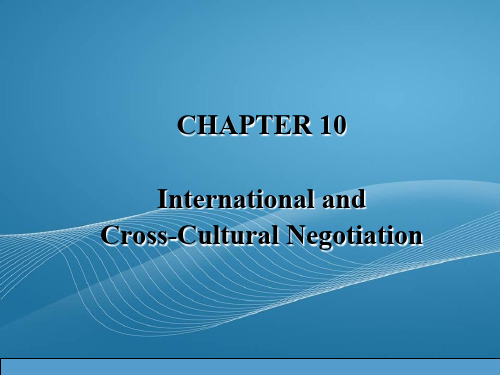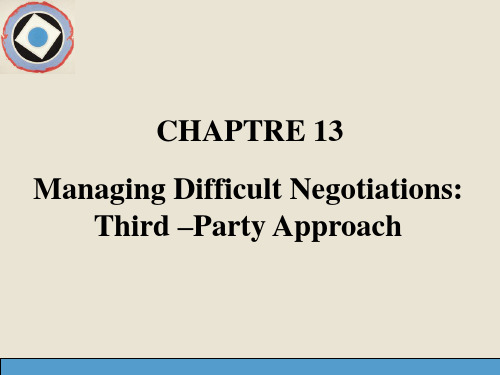国际商务谈判课件
合集下载
《国际商务谈判》罗伊列维奇。原版课件,第六章PPT

McGraw-Hill/Irwin © 2004 The McGraw-Hill Companies, Inc., All Rights Reserved.
3.1 Use of Language
• In negotiation, language operates at two levels: the logical level and the pragmatic level. • We often react not only to the substance of a threatening statement but also to its unspoken messages. Gibbons, Bradac, and Busch identify five linguistic dimensions of making threats. • Whether the intent is to command and compel, sell, or gain commitment, how parties communicate in negotiation would seem to depend on the ability of speaker to encode thoughts properly, as well as on the ability of the listener to understand and decode the intended messages. • A negotiators choice of words may not only signal a position but also shapes and predict it.
McGraw-Hill/Irwin © 2004 The McGraw-Hill Companies, Inc., All Rights Reserved.
3.1 Use of Language
• In negotiation, language operates at two levels: the logical level and the pragmatic level. • We often react not only to the substance of a threatening statement but also to its unspoken messages. Gibbons, Bradac, and Busch identify five linguistic dimensions of making threats. • Whether the intent is to command and compel, sell, or gain commitment, how parties communicate in negotiation would seem to depend on the ability of speaker to encode thoughts properly, as well as on the ability of the listener to understand and decode the intended messages. • A negotiators choice of words may not only signal a position but also shapes and predict it.
McGraw-Hill/Irwin © 2004 The McGraw-Hill Companies, Inc., All Rights Reserved.
《商务谈判》全套课件 PPT

第二章 商务谈判前的准备
• 第一节 商务谈判的信息准备 • 第二节 商务谈判方案的制定 第三节商务谈判的人员准备 • 第四节 商务谈判物质条件的准备
商务谈判的信息准备
•
•
信息收集的内容
宏观环境方面的信息。包括政治环境法律环境、 经济环境、技术环境和社会文化环境。 微观经济环境。商务谈判中的微观经济环境主 要指的是市场供求和竞争状况,既包括谈判本 身所涉及的产品的竞争与供求,也包括相关产 品的市场竞争与供求
商务谈判的原则
• 守法原则商务谈判是一种法律行为,它必须遵守 国家的有关法律、政策。涉外谈判,还应当遵守 国际法则并尊重对方国家的有关法规、惯例等。 • 诚信原则在谈判过程中,双方都应抱有合作的诚 意、高度重视信用问题,以诚相待,信任对方, 遵守诺言,在双方之间建立一种互相信任的关系, 以为签约后的长期合作打下基础 • 平等互利的原则平等协商,互利互惠 • 相容原则如何灵活准确地运用谈判策略和技巧的 问题。
主编: 王小兰
张晓青
第一章 商务谈判的概述
• 第一节商务谈判的含义与特征 • 第二节商务谈判的内容与基本要素 • 第三节 商务谈判的原则
什么是谈判
• 谈判是为了协调彼此之间的关系,满足各 自的需要,通过协商而争取达到意见一致 的行为和过程。 • 商务谈判是存在利益互补或利益差异的商 务活动的当事人,为了各自的经济利益目 标,所进行的自愿协商的过程。
二、成功谈判者的心理素质
(一)自信心 (二)耐心 (三)诚心(诚意)
第四章 商务谈判的基本策略
[本章主要内容]
• 1 商务谈判中的策略有哪些? • 2 商务谈判进程应对策略
• 3 商务谈判地位应对策略 • 4 商务谈判对方作风应对策略
《国际商务谈判》罗伊列维奇原版课件第十章

© 2004 The McGraw-Hill Companies, Inc., All Rights Reserved.
Environmental context
FIGURE 16.1 The context of international negotiations
Immediate context
Political consideration...
• International economics
The exchange value of international currencies naturally fluctuates
Any change in the value of currency
McGraw-Hill/Irwin
© 2004 The McGraw-Hill Companies, Inc., All Rights Reserved.
Environmental context
• Foreign governments
The extent to the government regulates industries and organizations
McGraw-Hill/Irwin
© 2004 The McGraw-Hill Companies, Inc., All Rights Reserved.
The titles
1. What Makes International Negotiation Different?
2. Conceptualizing Culture and Negotiation. 3. The Influence of Culture on Negotiation.
第六章 谈判的结束 《国际商务谈判》PPT课件

– Why is the other side rushing? Are they under pressure? Did we give up something too easily and they want to close before we realize our error?
• Delaying closure may also raise questions.
• At that point, identify what remains to be agreed.
• Identify what compromises may be possible.
Is it time to close?
• Both sides are satisfied the best deal has been struck and no further benefits can be obtained by further negotiation.
– Why is the other side delaying? Are they putting us under pressure? Do they want us to give up something we refused before?
Compromises
• Compromises can help resolve the outstanding issues.
• All outstanding issues can be resolved easily byition plays an important role.
Speed of Closing
• Rushing to close may raise questions on the other side and thereby delay their agreement.
• Delaying closure may also raise questions.
• At that point, identify what remains to be agreed.
• Identify what compromises may be possible.
Is it time to close?
• Both sides are satisfied the best deal has been struck and no further benefits can be obtained by further negotiation.
– Why is the other side delaying? Are they putting us under pressure? Do they want us to give up something we refused before?
Compromises
• Compromises can help resolve the outstanding issues.
• All outstanding issues can be resolved easily byition plays an important role.
Speed of Closing
• Rushing to close may raise questions on the other side and thereby delay their agreement.
《国际商务谈判》,罗伊列维奇,原版课件第十三章 PPT

McGraw-Hill/Irwin
© 2004 The McGraw-Hill Companies, Inc., All Rights Reserved.
FIGURE 13.2 Categories of Third-Party Intervention
Level of Negotiator Control over Outcome
McGraw-Hill/Irwin © 2004 The McGraw-Hill Companies, Inc., All Rights Reserved.
The titles:
1. Adding Third Parties to the Tow-Party Negotiation process. 2. Types of Third-Party Intervention: Formal Intervention Methods /Informal Intervention Methods 3. Alternative Dispute Resolution Systems: When the Organization Is the Third Party.
Low High
Low Level of negotiator control over procedure High
Autocracy
Mediation
Arbitration
Negotiation
McGraw-Hill/Irwin
© 2004 The McGraw-Hill Companies, Inc., All Rights Reserved.
McGraw-Hill/Irwin
© 2004 The McGraw-Hill Companies, Inc., All Rights Reserved.
国际商务谈判:理论、案例分析与实践(第五版)英文版课件chanpter 10

Conclusions about Negotiation from Behavior in the Prisoner’s Dilemma
• The C response is an antecedent of either the goal of coordination or trust
• Further explanation of the point by a similar model between the prisoner’s dilemma matrix and slightly altered strategic choice model
so C response ends up in CC cell, not other cells. • C response is a high risk form of coordinative behavior. It involves a costly concession to the other party without guarantee of reciprocation
S, T’ P, P’
C Party One
D
5, 5 10, -10
-10, 10 -5, -5
(a) schematic form
(b) numerical form
Indication of the labels
• C is the cooperative response • D is the noncooperative (defecting) response • R stands for payoff for mutual cooperation • S stands for payoff by the player who cooperates
国际商务谈判英文版课件
Paying attention to body language, legal expressions, and tone of voice can provide additional information
Non verbal communication
Repeating or summarizing what the other party has said can ensure that you have understanding their points correctly
Cultural factors in international business negotiations
04
Body language
Non verbal cues such as factual expressions, posts, and styles can convey messages that are just as important as what is said verbally
01
Course objectives
This course aims to provide students with the knowledge and skills necessary for effective international business negotiations
Course structure
Mediation
If necessary, a neutral third party can help resolve conflicts by facilitating communication and bridging cultural divisions
《国际商务谈判》_罗伊列维奇_原版课件第十三章_PPT
2 .Types of Third-Party Intervention
• Formal intervention: Arbitration Mediation Process consultation • Informal intervention: Inquisitorial intervention Adversarial intervention Providing impetus
McGraw-Hill/Irwin
© 2004 The McGraw-Hill Companies, Inc., All Rights Reserved.
FIGURE 13.2 Categories of Third-Party Intervention Level of Negotiator Control over Outcome
McGraw-Hill/Irwin © 2004 The McGraw-Hill Companies, Inc., All Rights Reserved.
Benefits and Liabilities of Third-Party Intervention
Benefits: • Creating breathing space or a cooling-off period. • Reestablishing or enhancing communications. • Refocusing on the substantive issues. • Remedying or repairing strained relationships. • Establishing or recommitting to time limits and deadlines. • Salvaging sunk costs. • Increasing levels of negotiators satisfaction with and commitment to the conflict resolution process and its outcomes
《国际商务谈判》,罗伊列维奇,原版课件,第七章PPT
CHAPTER 7
Finding and Using Negotiation Power
McGraw-Hill/Irwin
© 2004 The McGraw-Hill Companies, Inc., All Rights Reserved.
The Titles
1. Why Power is Important to Negotiators? 2. Sources of Power—How People Acquire Power ? 3. Dealing with Others Who have More Power ? 4. Chapter Summary
McGraw-Hill/Irwin © 2004 The McGraw-Hill Companies, Inc., All Rights Reserved.
2.2 Power Based on Personality and Individual Differences -2
• Motivational Orientation. Differences rooted
McGraw-Hill/Irwin © 2004 The McGraw-Hill Companies, Inc., All Rights Reserved.
A Definition of Power
• There are two perspectives on power: Power used to dominate and control the other and power used to work together with the other. • “Power over”, the power is fundamentally dominating and coercive in nature. This use of power implies powerlessness and dependence on the receiving end. • “Power with” , the power holder jointly develops and shares power with the other. The receiver experiences this power as empowered and independent.
Finding and Using Negotiation Power
McGraw-Hill/Irwin
© 2004 The McGraw-Hill Companies, Inc., All Rights Reserved.
The Titles
1. Why Power is Important to Negotiators? 2. Sources of Power—How People Acquire Power ? 3. Dealing with Others Who have More Power ? 4. Chapter Summary
McGraw-Hill/Irwin © 2004 The McGraw-Hill Companies, Inc., All Rights Reserved.
2.2 Power Based on Personality and Individual Differences -2
• Motivational Orientation. Differences rooted
McGraw-Hill/Irwin © 2004 The McGraw-Hill Companies, Inc., All Rights Reserved.
A Definition of Power
• There are two perspectives on power: Power used to dominate and control the other and power used to work together with the other. • “Power over”, the power is fundamentally dominating and coercive in nature. This use of power implies powerlessness and dependence on the receiving end. • “Power with” , the power holder jointly develops and shares power with the other. The receiver experiences this power as empowered and independent.
《国际商务谈判》罗伊列维奇-原版课件-第十章PPT
Immediate context • Relative bargaining power
• Levels of conflict • Relationship between
negotiators • Desired outcomes • Immediate stakeholders
McGraw-Hill/Irwin
(both the managerial perspectives and the research perspectives ) 4. Culturally Responsive Negotiation Strategies.
McGraw-Hill/Irwin
© 2004 The McGraw-Hill Companies, Inc., All Rights Reserved.
Environmental context
• Political and legal pluralism:
Taxes that an organization pays
Labor codes or standards
Different codes of contract law and standards of enforcement
McGraw-Hill/Irwin
© 2004 The McGraw-Hill Companies, Inc., All Rights Reserved.
The titles
1. What Makes International Negotiation Different?
2. Conceptualizing Culture and Negotiation. 3. The Influence of Culture on Negotiation.
